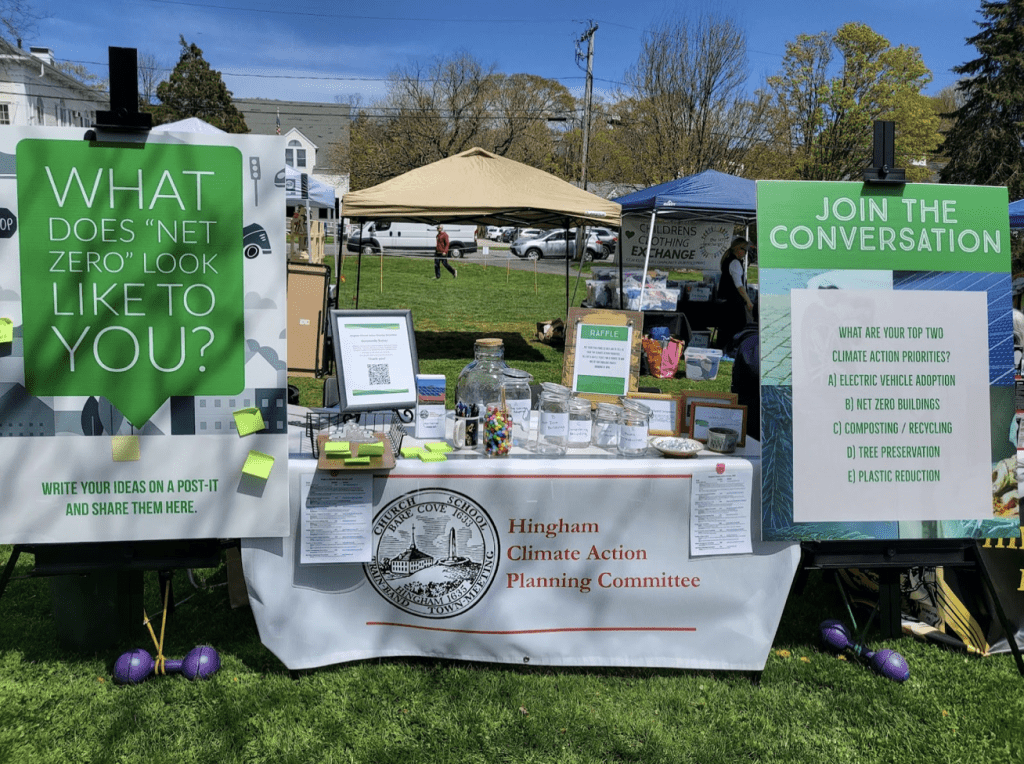
October 10, 2024 By Carol Britton Meyer
The Energy Action Committee is recommending the adoption of the state’s “Specialized Code” at the 2025 Town Meeting, designed to help Hingham and the overall Commonwealth achieve net zero by 2050 through additional regulations related to new residential and commercial construction. This is in keeping with the town’s goal of achieving net-zero carbon emissions.
The committee introduced the concept to the select board this week and will return for another presentation in November — to provide a fuller overview and to report on its community engagement efforts. The board asked questions, but no vote was taken.
The term “net zero” refers to when emissions of greenhouse gases and removal of these gases are in balance.
The Municipal Opt-In Specialized Building Code — its full name — builds on the existing Town Meeting 2018-adopted “stretch code” and focuses primarily on new construction, with no additional requirements beyond the current “stretch code” for additions, alterations, or renovations and all-electric new construction, except for multi-family housing over 12,000-square-feet.
Such multi-family housing would need to meet “Passive House” standards that prioritize a well-insulated and air-sealed envelope, natural light and solar gain, and highly-efficient HVAC systems.
A stretch code is part of the state building code which sets “above code” requirements for building energy performance compared to the base energy code – aiming to reduce greenhouse gas emissions related to the building sector to comply with statewide legal limits for 2025, 2030, 2040 and 2050.
Energy efficiency, efficient electrification
The Specialized Code relates to the Massachusetts Department of Energy Resources building code that — if adopted — would ensure that new construction is consistent with the 2050 net-zero goal through a combination of “energy efficiency and efficient electrification.”
The Code allows the use of fossil fuels, but also requires on-site solar generation and pre-wiring for future electrification of any fossil fuel-using equipment.
It also incentivizes builders toward all-electric new homes using heat pumps, and induction stoves, hot water heaters, and dryers.
The Specialized Code includes “pathways to compliance” for both all-electric and “mixed fuel” buildings (gas cooktops, water heaters, and other appliances in addition to all-electric heating and cooling), which must include infrastructure for future electrification. “Its provisions are expected to entail no or minimal additional costs and will not burden builders or suppress construction of new housing,” according to the Energy Action Committee.
Fossil fuel-powered emergency generators would be allowed for all building sizes and types. Also, there are no additional EV charging requirements beyond the ones related to the stretch code.
Adoption of the Specialized Code “provides an opportunity to address fossil fuel use in new construction and protects homeowners against future retrofit costs in any move toward electrification,” according to information provided by the committee.
Specialized Code adoption is also required in order to be considered for the DOER Climate Leader Communities Program, which is the next step in the Green Communities program.
There are 46 Massachusetts “green communities,” including Hingham (since 2018), that — with assistance from the Massachusetts Green Communities Designation and Grant Program — are eligible to apply for state grants for various potentially cost-saving energy initiatives. They include Cohasset, Scituate, Norwell, Weymouth, Rockland, and Hanover.
Any new residential or commercial construction using fossil fuel combustion systems (except multi-family housing over 12,000 square feet) would need to:
- provide pre-wiring for future appliance and HVAC electrification
- install a minimum amount of solar (with some exceptions for shading)
- for homes over 4,000 square feet, install enough solar or other renewables to offset all of the home’s energy use.
The committee has met with/apprised the building department, town administration, and some town committees about the potential adoption by Hingham of the Specialized Code and plans to reach out to additional town departments and community groups as well as host public information sessions.
The Climate Action Commission and Energy Action Committee both voted unanimously to sponsor an opt-in warrant article for Town Meeting 2025.
The Hingham Climate Action Plan reports that buildings (primarily heating) account for almost 70% of Hingham’s carbon emissions and includes the recommendation: “Adopt the Massachusetts Opt-in specialized stretch code,” EAC members note.
Outreach to key stakeholders is part of the initiative to educate those who would be affected by the adoption of the Code and the entire Hingham community and to socialize the warrant article leading up to Town Meeting.



